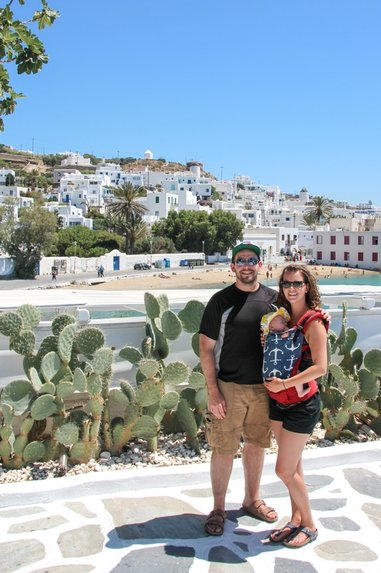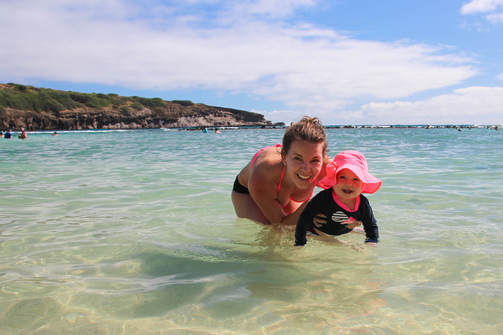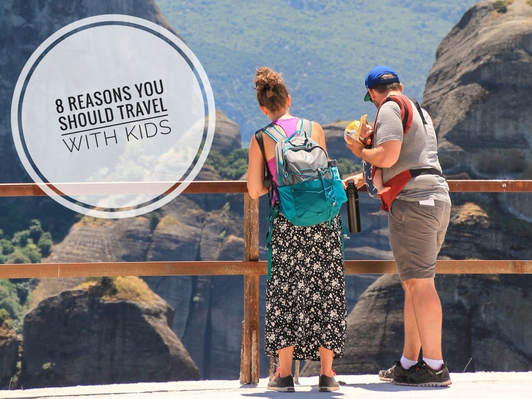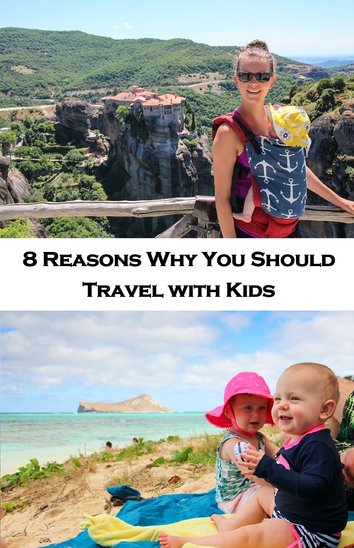
Traveling as a family can be intimidating! When we announced that we were pregnant it seemed like everyone assumed that this meant we wouldn't be traveling at all, or at least not for a while. When we booked our trip to Greece when our daughter was 3 months old we heard it all from "that doesn't sound like fun" to "good for you but I could never do that". Having done trips when she was 3, 6, 10 and 18 months old, as well as a trip with a 2.5 year old and 9 week new sibling, I can say that every age has its unique challenges but, in general, starting early gave us confidence and showed us that not only was it possible, but that it was really fun! If you are nervous about booking your first trip as a family, whether your baby is 3 months old, 3 years old, or 13 years old, here are 8 reasons why I think you should start now:
1. Quality Family Time Sure you can have quality family time at home. But more than likely your weekends are packed with grocery shopping, cleaning, running errands and doing odd jobs around the house. It’s easy to say you’re going to spend time making memories together and another thing completely to find the time and space to do it. Traveling gives you extended, uninterrupted time together away from the distractions and obligations of home. You can leave the cooking and cleaning to someone else and focus on bonding as a family. This time becomes all about enjoying the little moments together, making memories, and starting new family traditions.
2. It’s a big world out there! Traveling with your kids from an early age shows them that there is life outside of the bubble of their home and city. It shows them that the world is accessible, safe, and there for them to explore and experience. It allows them to pursue work, education, and volunteer opportunities that fit their passions and interests no matter the location. It also gives them the skills to be a confident, and resourceful traveler. These skills that are important whether they travel with friends, a sports team, to a new city for school, or on a business trip.
3. Roll with the Punches. When you travel, things don’t always go as planned. Your flight is delayed, your car rental place doesn’t exist anymore, or a hurricane swoops in on your beach vacation (yes those all really did happen!). Traveling teaches your kids that sometimes things don’t go as planned and that’s okay! Showing your kids how you react to stress, failure and disappointment and how to be adaptable and resourceful in the face of the unexpected gives them the skills they need for when things inevitably go wrong in the real world. Plus, they will learn that some of the best memories come from those times when the unpredictable happened!
4. Be Flexible. That sleep schedule that you’ve worked so hard to establish? Sometimes your flight lands in the middle of nap time. Dinner at 5 p.m.? In many European cities, restaurants don’t open until much later. Bed time is 7 p.m.? Some events just can’t be done during the day. Traveling teaches kids to be flexible when routine is disrupted and to develop patience when things don’t go their way. Not only do these lessons help them adapt to changes in their every day life, it can make going on day trips and weekend adventures closer to home less daunting, knowing that deviating from routine isn’t the end of the world.
1. Quality Family Time Sure you can have quality family time at home. But more than likely your weekends are packed with grocery shopping, cleaning, running errands and doing odd jobs around the house. It’s easy to say you’re going to spend time making memories together and another thing completely to find the time and space to do it. Traveling gives you extended, uninterrupted time together away from the distractions and obligations of home. You can leave the cooking and cleaning to someone else and focus on bonding as a family. This time becomes all about enjoying the little moments together, making memories, and starting new family traditions.
2. It’s a big world out there! Traveling with your kids from an early age shows them that there is life outside of the bubble of their home and city. It shows them that the world is accessible, safe, and there for them to explore and experience. It allows them to pursue work, education, and volunteer opportunities that fit their passions and interests no matter the location. It also gives them the skills to be a confident, and resourceful traveler. These skills that are important whether they travel with friends, a sports team, to a new city for school, or on a business trip.
3. Roll with the Punches. When you travel, things don’t always go as planned. Your flight is delayed, your car rental place doesn’t exist anymore, or a hurricane swoops in on your beach vacation (yes those all really did happen!). Traveling teaches your kids that sometimes things don’t go as planned and that’s okay! Showing your kids how you react to stress, failure and disappointment and how to be adaptable and resourceful in the face of the unexpected gives them the skills they need for when things inevitably go wrong in the real world. Plus, they will learn that some of the best memories come from those times when the unpredictable happened!
4. Be Flexible. That sleep schedule that you’ve worked so hard to establish? Sometimes your flight lands in the middle of nap time. Dinner at 5 p.m.? In many European cities, restaurants don’t open until much later. Bed time is 7 p.m.? Some events just can’t be done during the day. Traveling teaches kids to be flexible when routine is disrupted and to develop patience when things don’t go their way. Not only do these lessons help them adapt to changes in their every day life, it can make going on day trips and weekend adventures closer to home less daunting, knowing that deviating from routine isn’t the end of the world.
Like this post? Want to read it later? Pin it!
5. It’s not all about them. When I was 12, my parents piled us in a van and drove us all the way to Florida. They were making good on a promise to take us to Disneyworld when my brother was old enough. We saw Disneyworld and also Busch Gardens. We lounged at the pool and went mini golfing. It was All. About. Us. On the way home though? We stopped at the baseball hall of fame (even though Cooperstown wasn’t on our route). The lesson was that a family vacation is about the whole family and not every stop or sight will appeal to everyone. Exploring each family member’s special interests and planning trips that have something for everyone teaches them respect and compromise and hopefully brings everyone closer together.
6. Hands on Learning. So much of the learning that our children do, both at home and school, is from books or on a screen. Pictures are worth a thousand words but traveling gives them real world, hands on experiences. Interested in lions? Head to the savannah to see them in their natural habitat. Love thai food? Travel to Chiang Mai to take a cooking lesson from the locals. What’s better than learning about the rainforest by hiking in Costa Rica? And learning about the fall of the Berlin wall from Germans who lived through it? Priceless. Being able to touch, see, hear and experience history, geography, food and culture will make learning more meaningful and lasting.
6. Hands on Learning. So much of the learning that our children do, both at home and school, is from books or on a screen. Pictures are worth a thousand words but traveling gives them real world, hands on experiences. Interested in lions? Head to the savannah to see them in their natural habitat. Love thai food? Travel to Chiang Mai to take a cooking lesson from the locals. What’s better than learning about the rainforest by hiking in Costa Rica? And learning about the fall of the Berlin wall from Germans who lived through it? Priceless. Being able to touch, see, hear and experience history, geography, food and culture will make learning more meaningful and lasting.

7. Us vs Them. The media (and some politicians) would have you believe that the world is a big and scary and that people are generally dangerous, or at the very least, unfriendly. Traveling teaches you that it’s really quite the opposite. Travel opens you up to meeting people who speak different languages, dress differently, and eat different foods. Giving your children an opportunity to experience a variety of cultures helps them learn that there are lots of different ways to live. It also teaches them not to fear people, food, or environments that are different than they are used to. When they are back home, maybe they will be more likely to make friends with someone who looks different than them, try new foods or step out of their comfort zone in other ways. They might also discover new interests, hobbies and passions while traveling that they wouldn’t have been exposed to otherwise.
8. Less is More. Traveling teaches kids that they need less stuff than they think. Part of this lesson will come from realizing you can only pack so much in your suitcase. Also, in many places in the world families have far fewer toys, clothes, and electronics than we do. Seeing how other children live firsthand can give your kids perspective on what they really need and help them develop gratitude for the things that they have. It also helps them value experiences and time with people over the acquisition of things. As a parent, I have been reminded of this lesson often. While packing I wonder whether how my kids will do without the toys and activities they are used to. I feel "bad" that I can only pack a few of my daughters favourite things only to find that she busies herself with a colander, clothespins and other things she finds in the cupboards and seems to enjoy it just as much.
Tell us what you think! Is there anything we missed? What are your top reasons to travel as a family?
8. Less is More. Traveling teaches kids that they need less stuff than they think. Part of this lesson will come from realizing you can only pack so much in your suitcase. Also, in many places in the world families have far fewer toys, clothes, and electronics than we do. Seeing how other children live firsthand can give your kids perspective on what they really need and help them develop gratitude for the things that they have. It also helps them value experiences and time with people over the acquisition of things. As a parent, I have been reminded of this lesson often. While packing I wonder whether how my kids will do without the toys and activities they are used to. I feel "bad" that I can only pack a few of my daughters favourite things only to find that she busies herself with a colander, clothespins and other things she finds in the cupboards and seems to enjoy it just as much.
Tell us what you think! Is there anything we missed? What are your top reasons to travel as a family?


